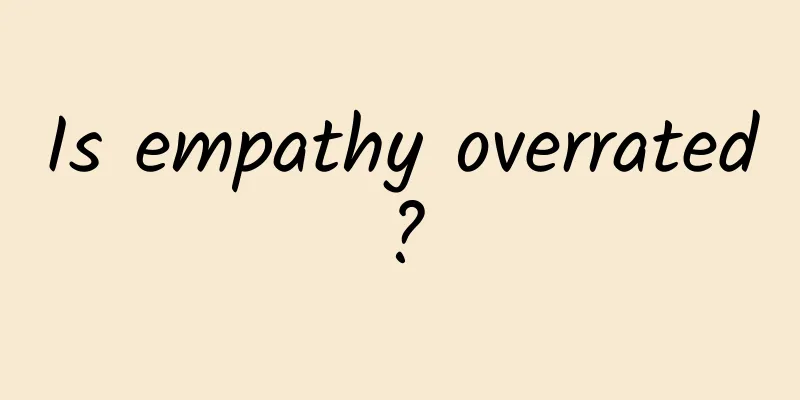Is empathy overrated?

|
Leviathan Press: Personally, I think that in a broad cultural sense, the positive effects of empathy seem to outweigh its negative aspects, but it can also easily slide into "a kind of self-kitsch": Imagine that someone always reminds himself that he should be a person who is sensitive to the suffering of others, so that in the process of practice, he ignores the party who really needs help, and only sees a result that makes him feel satisfied (for example, I think I gave him timely help when he needed comfort the most). On the surface, he seems to have completed the construction of empathy, but he actually did not touch the root of the other person's pain at all. From the perspective of neurology and linguistics, when a person says "my tooth hurts", the "pain" he refers to may not be the "pain" in your inner experience, that is, you do not understand his pain. This can also reflect on the recognition of empathy from one aspect: humans are such a self-righteous species, and perhaps in many cases, what they think of as empathy is just a kind of self-placebo. I used to know a guy named Steven who always called himself an empath. In fact, I know a lot of people who are like that. I often work with artists, actors, and LGBTQ people who read a lot of self-help books; in these circles, people often identify as empaths. But when I think about the misunderstood nature of empathy, and how it has become overhyped in our culture, I always think of Steven. Steven was a kind, warm-hearted, well-connected man. He was perceptive and fascinated by the inner lives of everyone around him. He loved to spread good-natured gossip and always knew who was suffering, which friends were fighting, and who was hooking up with whom. If a couple of years were planning to divorce, he would be the first to know. If someone got a new job or got accepted to graduate school, he would be the first to show up to celebrate. Sometimes Steven’s emotional intuition makes me feel like a superhero. He once comforted me when I was drunk and crying at a crowded party. I will never forget how loved and protected he made me feel in that moment. We barely knew each other at the time, but he knew exactly what to say to calm me down. At other times, Steven’s empathy seemed like a protective facade. He was usually pretty good at reading other people’s minds, but had trouble respecting them when they seemed uncomfortable or didn’t want to do what he wanted. He told everyone else everything his friends had confessed to him—no matter how embarrassing or awful it was. Once, when I told him about a man who had been stalking and harassing me on the street, Steven became so distressed that I had to comfort him. His excessive empathy sometimes pushed us away from each other instead of helping us connect. Feeling other people’s emotions doesn’t automatically make you a good person. Our culture is obsessed with the power of empathy. Every time a politician strips a marginalized group of their rights, the left publicly accuses them of a lack of empathy. When hate groups attack and spew vitriol, their apparent lack of empathy is seen as the root of evil. Even critiques of capitalism inexplicably turn into conversations about empathy. People seem to think that the most pressing problem is the lack of love among billionaires, not the system of power and capitalism that made them billionaires. As an autistic person who focuses on social issues, this obsession with empathy frustrates me. Feeling someone else’s emotions doesn’t automatically make you a good person. Being emotionally sensitive doesn’t ensure you’ll take the necessary steps to help someone. And those of us who have trouble feeling empathy aren’t monsters or robots. We’re just as capable of compassionate behavior as anyone else. Empathy is overrated. It’s a seductive illusion. The truth is, we can never know how another person feels, nor do we need to. We don’t need intuitive, magical empathy to help others or right society’s wrongs. Our actions and choices matter more than how we feel. Empathy is an illusion You may have heard empathy defined as "feeling someone else's feelings." Even in psychology, we often explain empathy this way. When someone else is sad, an empathic person feels sad, too. When you witness someone getting beaten, empathy might cause your own brain to activate with pain. It's almost like having psychic powers, right? Empathy is a simulation of what you think another person might be feeling. The problem with this definition of empathy is that people tend to take it literally. Self-identified empaths (and highly sensitive people, or HSPs) often believe they have a unique intuition, a “sixth sense” for how other people are feeling. Virtually every popular book about empaths and HSPs reinforces this belief. They describe empathy as a “gift,” using awe-inspiring, vague language that suggests it’s almost like magic. This is not the case. Empathy is an illusion at best. Empathy is an emotional simulation of what you think another person might be feeling. These simulated emotions can be intense and gripping, but that doesn’t mean they’re correct. If a person’s facial expressions are hard to read, or if their experiences and reactions are unusual, empathy may not be able to tell you what they’re going through. (link.springer.com/chapter/10.1057/9780230584464_10) I am autistic and empaths always misread my emotions. I used to have a coworker named Lauren who was very sensitive and kind. Lauren was convinced that I was a miserable, lonely person. Every time she walked by my office to say hello, she would notice that I was frowning, so she would frown back in an exaggerated way and ask in a low, worried voice if I was "okay" - as if I was a scared bunny lying injured in the woods. When Lauren looked at me, she felt a little sad and uncomfortable. She thought that meant I was sad and uncomfortable, too. In reality, my relaxed facial expression was just bland and could seem “cold,” especially to a non-autistic person. Research shows that neurotypical people often feel uneasy around autistic people, even if they can’t pinpoint why. A big part of this is often confusion about how we express our emotions. In trying to connect with me emotionally, Lauren made me feel alienated and misunderstood. (www.ncbi.nlm.nih.gov/pmc/articles/PMC5286449/) When we become overconfident in the intuitive magic of empathy, we risk making all sorts of mistakes. We might think a person on trial for a crime is cold and antisocial, when in fact they are frozen in fear. Non-black people might think a black woman is “angry” because racism clouds our perception. We might only empathize with people who express emotions in ways we consider normal—based on our own culture. Rather than connecting us, misplaced empathy can push us apart. Empathy is not perspective taking In psychology, we sometimes distinguish between affective/emotional empathy and cognitive/mental empathy. Emotional empathy is feeling what (what we think) another person is feeling. When people use the word “empathy,” this is what they mean. Cognitive empathy, also called perspective-taking, is imagining seeing the world through another person’s eyes and thinking about what they might be experiencing. Perspective taking differs from empathy in many ways. First, perspective taking is a skill that anyone can practice. You don't have to be born good at it. Perspective taking involves thinking carefully about someone's life, critically analyzing how they think, and updating or refining our understanding as new information comes to light. It's not an instinct, but a behavior you can choose to adopt. (link.springer.com/article/10.1007/s40617-018-0207-2) Many people with autism—as well as people with attention deficit hyperactivity disorder (ADHD), antisocial personality disorder, borderline personality disorder, and other conditions—have difficulty with empathy. We often overcompensate for this by developing sharp perspective-taking skills. I can’t always read someone’s emotions from their face or tone of voice, but I can pay attention to what they say, think about what I know about them and their lives, and draw reasonable conclusions from all that data. (bpsmedicine.biomedcentral.com/articles/10.1186/1751-0759-1-22) I spend a lot of time thinking about other people's lives, trying to piece together an understanding of the ways they might experience the world. Whenever I meet a stranger, I try to think about how to avoid accidentally hurting or alienating them. If they're part of a marginalized group, I keep in mind the ignorant, mildly invasive things people might say to them all the time, and try to avoid that. If they're sharing private, sensitive information with me, I try to listen carefully instead of responding with hurtful platitudes. I am always shocked when a non-autistic person who is supposedly more empathetic enters the same conversation and immediately responds with a thoughtless remark or a spiel about optimism or downplays the emotions of others. This lack of concern is incomprehensible to me. Yet people who are considered empathetic behave in this nonchalance all the time. Some people find socializing so easy that they never have to learn perspective taking. As a result, many of their interactions are thoughtless, snappy, and, in other words, pretty superficial. The empathy is overwhelming Another downside to empathy is that it can become overpowering. When you get caught up in sensing someone else’s emotions (or at least what you think they are), you may not be able to think clearly. You may even have trouble seeing the person you’re empathizing with clearly. People with autism often stereotype themselves as lacking empathy, but a common theory about autism is that we experience excessive, distressing amounts of empathy. People with autism can easily become overloaded with the pain, anger, and even joy of others. We can become confused by emotions so strong and hard to name. It can cause us to melt down or disintegrate. (www.scientificamerican.com/article/people-with-autism-can-read-emotions-feel-empathy1/) (www.ncbi.nlm.nih.gov/pmc/articles/PMC6056680/) Sometimes I get stressed when people are making noises or laughing too loudly; their joy makes me feel tense even though I want to share it. On the other hand, deep conversations with people in pain can leave me exhausted for days afterwards. When I become overwhelmed by another person’s emotions, I start to withdraw. I seem more distant and robotic than usual. I may not be able to make eye contact. I may even fall into a deep sleep. This is a state in which people with autism “shut down,” but people mistakenly interpret this as apathy and a lack of empathy. (www.autismsociety-nc.org/sensory-overload/) The real problem is that strong empathy can sometimes inhibit helping behavior. Empathy can also overwhelm non-autistic people in hurtful ways. Sometimes people are so focused on how others are feeling and over-empathize with them that they forget to focus on the people who are really hurting. For example, a white person might cry so hard about racism that it takes the focus away from the people of color who are really suffering. Or a supposedly supportive feminist friend might be so distressed by hearing about your ex's abusive behavior that you find yourself having to comfort them instead of them comforting you. Many people would attribute this behavior to narcissism, but narcissistic people are capable of being as caring and compassionate as anyone else. The problem here is not that people have strong emotions about things that have nothing to do with them. These feelings are completely neutral, neither evil nor good. The real problem is that strong empathy can sometimes inhibit helping behavior. It’s totally fine to feel intense grief on behalf of someone else — as long as you don’t mistake that with taking productive action. Ultimately, your actions are far more important than how you feel. Empathy is not sympathy Empathy is an internal experience. On its own, it does nothing to correct structural injustices or bring comfort. When the progressive left decries a lack of empathy in our culture, what they really mean is a lack of compassion. Thankfully, one does not need empathy to act compassionately. Compassion drives us to do things like look after an elderly relative who lives alone, donate to a crowdfunding campaign for the unemployed, and volunteer our time to drive people to the polls. Unlike empathy, which is primarily driven by emotion, compassion can be emotional, intellectual, or even philosophical in nature. If I decide to support my university’s graduate student union, it may be because I feel sad about the exploitation of its workers, or it may be because I recognize intellectually that such an effort is important. Whether it is my heart or my mind that guides my compassionate actions is unimportant. What matters is that I choose to participate. Whether or not we have empathy, people with autism are often deeply compassionate. People who are more demonized, such as those with antisocial personality disorder or borderline personality disorder, can also be compassionate without being empathetic. You don’t have to feel someone else’s feelings to care about their well-being. You just have to believe that human life has value and that humans should avoid and minimize suffering whenever possible. (bpsmedicine.biomedcentral.com/articles/10.1186/1751-0759-1-22) Unfortunately, many highly empathetic people don’t realize that a life without empathy can be just as connected and loving as one with it. They may believe that empathy is the only way to take social injustice seriously. In fact, some even believe that empathy itself is an act of sympathy. That’s not the case. You can’t just empathize deeply with someone who is suffering. That’s as ineffective as praying for them. If you really want to improve a person’s situation, you have to invest time and resources into helping them. Empathy is overrated. To those who experience it, it seems like the most authentic human connection that exists. But as someone with limited empathy who cares deeply about humanity, take my word for it: your empathy is an illusion. It is no substitute for conscious consideration for others and what they might need. If empathy fills you with a deep desire to improve humanity, great. Listen to that impulse. Translate your feelings into direct action. And while you do that, don’t demonize those of us who take action for other reasons. By Devon Price Translated by Kushan Proofreading/Rabbit's Light Footsteps Original article/humanparts.medium.com/empathy-is-overrated-6cf4090c601e This article is based on the Creative Commons Agreement (BY-NC) and is published by Kushan on Leviathan The article only reflects the author's views and does not necessarily represent the position of Leviathan |
Recommend
What should I do if I have lower back pain due to bleeding during ovulation?
When women reach their menstrual period, their bo...
CAMIA: Cambodia’s Mobile Payment Industry
While cash remains the undisputed king in Cambodi...
No more worries about having a long nose (Part 2) - Home care for nasogastric tubes
This is the 4604th article of Da Yi Xiao Hu Nasog...
Is colposcopy uncomfortable?
In order to identify some gynecological diseases ...
Research on the application of infrared, shortwave and electrotherapy in elderly rehabilitation treatment
With the acceleration of population aging, the he...
How long does it take to get your period after hysteroscopy?
Hysteroscopy is a common treatment method. Patien...
Benefits of daily running for women
Many women are in the process of losing weight. D...
How to reduce belly fat after giving birth
After you have given birth to a child, your body ...
Nipple pain in early pregnancy
After pregnancy, expectant mothers' bodies wi...
Prevention of sequelae of breast augmentation surgery
Many female friends in life feel that their breas...
Why do I have cervical pain after sex?
Sexual intercourse is an important part of couple...
No menstruation after emergency contraception
Because many couples are busy with work nowadays,...
Can I still have a baby after having half of my uterus removed?
In daily life, we often see patients whose cervix...
Long-term fatigue and poor condition may be due to lack of butyrate
Author: Zhao Bei Have you ever been extremely tir...
Why do I need to wear a space maintainer if my deciduous teeth are lost prematurely?
In clinical practice, many children's deciduo...









